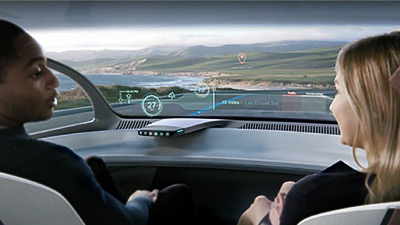Carnegie Mellon University alumni and former staff members at the National Robotics Engineering Center (NREC) founded Argo AI, an artificial intelligence startup in which Ford Motor Company will invest $1 billion over the next five years.
The startup, based in Pittsburgh with sites in Michigan and the San Francisco Bay Area, will develop a self-driving system for an autonomous vehicle that Ford plans to produce in 2021. In the future, Argo AI might license the software platform to other companies and in other sectors.

All four of Argo AI’s senior leaders have strong ties to Carnegie Mellon. Bryan Salesky, chief executive officer, is a former project leader at NREC who most recently worked with Google’s self-driving car program. He also was software lead for CMU’s Tartan Racing Team, which won the Defense Advanced Research Projects Agency’s $2 million Urban Challenge race for self-driving cars in 2007.
Peter Rander, chief operating officer, earned master’s and doctoral degrees from the Electrical and Computer Engineering Department in 1993 and 1998, respectively, and is a former NREC project leader and an engineering lead at the Uber Advanced Technologies Center (ATC) in Pittsburgh. Brett Browning, vice president of robotics, is a former senior systems scientist at the Robotics Institute and NREC and formerly of Uber ATC. Daniel Beaven, chief financial officer, earned an MBA at the Tepper School of Business in 2003 and was a top financial officer at Carnegie Robotics — a spinoff from NREC — and at Uber ATC.
“We founded Argo AI to tackle one of the most challenging applications in computer science, robotics and artificial intelligence — self-driving vehicles,” Salesky said in a blog posted on behalf of the Argo AI team. “Autonomous vehicles have the potential to save thousands of lives, to extend personal mobility to many who might not have it, and to transform the landscape of an urban setting.”
Ford President and CEO Mark Fields said the Argo AI team will develop the software platform for a “level 4” autonomous car. A level 4 self-driving system can control a car without the need for driver attention in all but a few environments, such as severe weather.
“It’s no coincidence that major corporations, such as Ford, come to Pittsburgh to develop self-driving technology,” said Andrew Moore, dean of the School of Computer Science. “They need the best-trained, most talented people for this task and Pittsburgh is the place to find them. We’re excited for Argo AI, which was founded by people who cut their teeth on self-driving cars at Carnegie Mellon’s School of Computer Science and College of Engineering. And we’re excited about the improved safety and efficiency that this new technology will provide for us all.”
Argo AI expects to have more than 200 team members at its three sites by the end of the year.
“This is an exciting announcement, and further illustrates that Carnegie Mellon University and the city of Pittsburgh are at the center of autonomous vehicle research and development," said James H. Garrett Jr., dean of the College of Engineering. “Carnegie Mellon’s School of Computer Science and College of Engineering have conducted over 30 years of research and development in autonomous vehicles that is the foundation for much of the commercial activity we are seeing today. We are extremely proud of the co-founders of Argo AI, who all have ties to Carnegie Mellon and our Electrical and Computer Engineering Department and National Robotics Engineering Center.”
Footnotes
Photo: Argo AI COO Peter Rander, Ford President and CEO Mark Fields, Argo AI CEO Bryan Salesky and Ford Executive Vice President of Product Development and Chief Technical Officer Raj Nair




